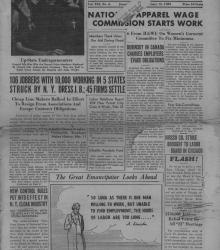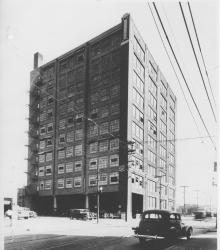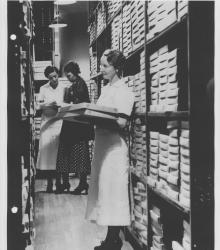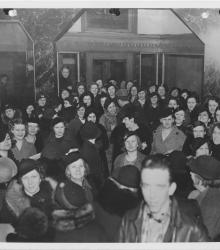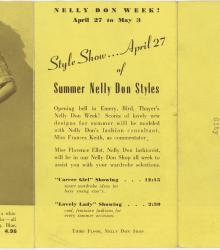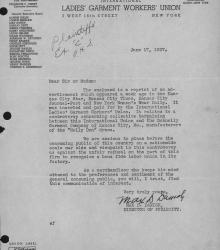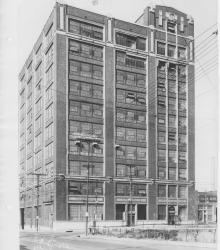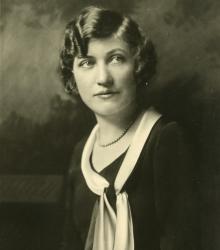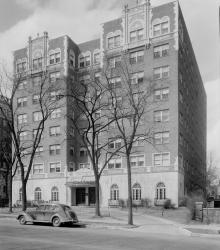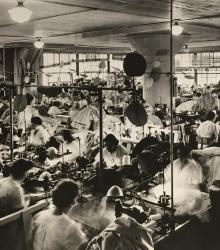Full-page advertisement by International Ladies' Garment Workers' Union (ILGWU) in the June 8, 1937 issue of the Kansas City Journal-Post. The ILGWU responds to criticism directed towards the union by the Kansas City Citizens' Protective Council, Inc. in a May 13, 1937 advertisement.
Reed, Nell Donnelly
Front page to the February 15, 1939 issue of Justice, a magazine published by the International Ladies' Garment Workers' Union in Jersey City, New Jersey. Pictured are three undergarment workers employed at the Hoosick Falls (NY) Undergarment Company and a cartoon of Abraham Lincoln.
Photograph of the Corrigan Building at 1828 Walnut, Kansas City, Missouri, occupied at the time by The Donnelly Garment Company beginning in 1928. This vantage point faces northeast on 19th Street from just east of Main Street.
Photograph of the shipping stock room, at The Donnelly Garment Company in the Corrigan Building at 1828 Walnut, Kansas City, Missouri. Items in this room are prepared and processed for shipment.
Photograph of protestors at a demonstration on March 17, 1937 by the International Ladies Garment Workers Union.
A pamphlet showcasing six wardrobes from Nelly Don Soapsuds Fashions'. This specific document was mailed to Miss Adelaide Navious of 3028 Baltimore Avenue, Kansas City, Missouri.
A form letter from International Ladies' Garment Workers' Union (ILGWU) Director of Publicity Max D. Danish to garment merchandisers.
Photograph of the Corrigan Building at 1828 Walnut, Kansas City, Missouri, occupied at the time by The Donnelly Garment Company beginning in 1928. This vantage point faces northwest towards the front of the building from 19th Street between Walnut Street and Grand Avenue (now Grand Boulevard).
Nell Donnelly and her chauffeur, George Blair, were kidnapped on December 16, 1931. Donnelly had become famous after her 1916 founding of the Donnelly Garment Company, which sold stylish but affordable dresses for daily wear by ordinary women. Backed by the sales of “Nelly Don’s,” as the dresses became known, the company grew into a multi-million dollar business with over 1,000 employees in the 1920s.
Johnny Lazia (born Lazzio) gained prominence in Kansas City’s politics during the 1920s and ‘30s due to his leadership of the North Side Democratic Club, engagement in local organized crime, and involvement with Tom Pendergast’s political machine. Pendergast dominated Kansas City politics not by holding elected offices, but through his machine of alliances and affiliates.
The history of the Donnelly Garment Company and its battle with the International Ladies Garment Workers Union (ILGWU) is one that defies conventional understandings of American life in the Great Depression. It is a story of a female entrepreneur succeeding in an era of economic paralysis, and one of a union failing to organize a factory in a period when workers won substantive rights. ILGWU president David Dubinsky, Nell Donnelly Reed, and Senator James A. Reed were the principal figures in a contest to organize a single garment factory, a legal battle that came to represent much larger questions.

